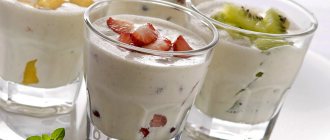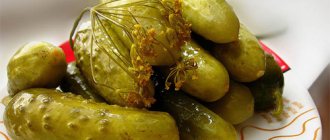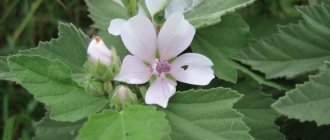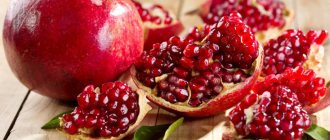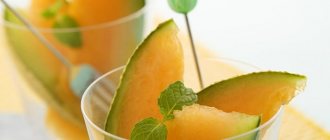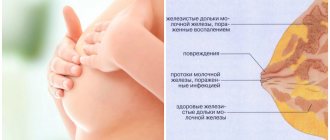Pineapple during breastfeeding improves immunity, saturates the body with valuable minerals, promotes postpartum recovery of the mother and the harmonious development of the baby. A special advantage of the fruit is its benefits for weight loss. Drinks, salads, and added to main courses are prepared from the fruits.
Is it possible to eat pineapple while breastfeeding? Yes, the fruit is eaten and introduced into the diet no earlier than the fourth month of lactation, starting with a small portion. In the absence of a negative reaction from the baby, the dose in the diet is gradually increased.
Product composition, calorie content
Eating pineapple for a nursing mother is beneficial due to the presence of nutrients: the flesh of the fruit contains vitamins A, E, C, PP, K, group B, microelements: potassium, sodium, iron, magnesium, phosphorus, zinc, selenium, boron, iodine, calcium . The fruit contains fiber, antioxidants, sugars, ash, enzymes, amino acids, and bioflavonoids.
Fruit composition:
- 85% - water;
- calorie content is 48 kcal per 100 g;
- proteins - 0.3 g, fats - 0.1 g, carbohydrates - 11.8 g per 100 g.
Are canned pineapples in syrup good for nursing mothers?
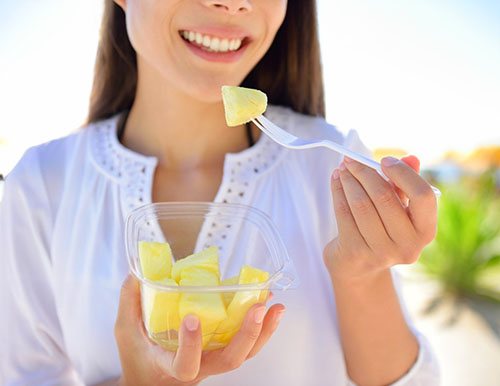
But to the question: “Can a nursing mother have canned pineapples?”, there should be a clearly negative answer. Although the juiciness and appearance of the product in a colorful jar are preserved, most of the beneficial properties of the pulp of fresh fruits are irretrievably lost.
As a result of heat treatment, ascorbic acid, the predominant vitamin in pineapple, breaks down.
Since several unripe fruits are sometimes used for the production of industrial canned food, in order to give them taste and long-term shelf life of the product, a lot of sugar is necessarily present in the recipe. This means that the calorie content of canned fruit increases sharply. In addition, the syrup may contain artificial preservatives, flavor enhancers and even dyes, which make canned pineapple not only useless but also harmful for a nursing mother.
Varieties
There are at least 60 types of fruit. Their differences are in size, color of fruit, shape, smell. Many varieties are grouped.
Cannara is one of the royal varieties. The fruits grow up to 1.4-1.6 kg, smell pleasant, and have a conical shape. Their flesh is golden yellow, with high acidity.
The Smooth Cayenn group includes the varieties Maipuri, Sarawak, Esmeralda, Kew, Saint Michel. The fruits are ovoid in shape, grow up to 2.5 kg in weight, and have short stalks. The flesh of this type of pineapple is juicy and yellow.
The Spanish group includes Piña Blanca, Spanish Red, Cabezona, Valera. The weight of the fruit reaches 10 kg. A number of varieties do not have spines on the leaves. The varieties are considered table varieties; they are inferior in taste to dessert varieties.
One of the best varieties is Mauritius. The fruits tolerate transportation well and have an excellent taste. The Abacaxi group includes fruits with almost white skin. These are the varieties Black Jamaica, Montúfar.
Amrota is a hybrid. The leaves of the plant are spiny, the fruits are cylindrical, weighing up to 2 kg. The aroma is soft, pleasant, the skin is no thicker than 6 mm. The pulp is dense, pale yellow in color, and the taste is not very sour.
MD-2 is a hybrid variety recognized as a standard in the international fruit market. The plant was bred in Hawaii and has been cultivated on an industrial scale since 1996. The fruits have a long shelf life, are cylindrical in shape, and can remain fresh for up to 30 days.
How to introduce pineapple into your diet while breastfeeding
So can a nursing mother eat pineapple? It would seem that such an impressive list of contraindications is tantamount to an unequivocal “No!”
However, among all the contraindications directly related to breastfeeding, only the allergenicity of the fruit relates, so a nursing mother who does not suffer from food allergies and gastrointestinal diseases can eat pineapple, taking some precautions.
Breastfeeding experts recommend experimenting with pineapple no earlier than the child turns 5 months old.
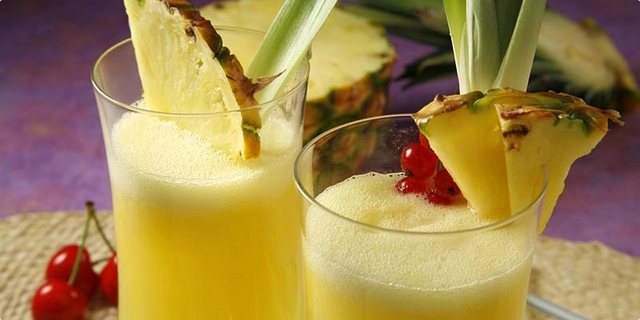
You should start with a very small piece of fresh, not canned pineapple. If monitoring your child for 24 hours does not reveal typical symptoms of food allergies (hives, itching and flaking of the skin, runny nose, flatulence, regurgitation), then you can continue to eat pineapple in small quantities.
If we talk about candied fruits, then, given their acidity, it is undesirable to eat more than 6-7 cubes per day. As an independent dish, of course, this will be very little, so candied fruits can be added to porridge or cottage cheese.
You should also be careful with pineapple juice and consume no more than half a glass per day. Nutritionists consider it more useful to make nectar from juice - i.e. dilute 1 part juice with 3-4 parts water.
Canned pineapples should be completely abandoned during breastfeeding.
Properties of bromelain
Bromelain is an enzyme found in some plants, including pineapple. It has the ability to digest proteins. The substance is obtained from the pulp and stems.
Beneficial properties of the enzyme:
- reduces the inflammatory process;
- eliminates swelling;
- regenerates wounds;
- facilitates digestion;
- heals the heart;
- reduces the number of cancer cells.
To obtain the enzyme, eat the pulp, drink juice or use dietary supplements. It is not recommended to take bromelain if you have bleeding disorders or allergies.
Difference from fresh fruit
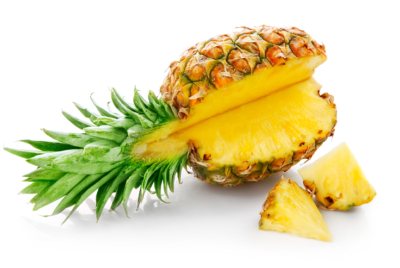
- B vitamins;
- provitamin A;
- vitamin PP;
- potassium, necessary for a young mother and child for the good functioning of the cardiovascular and nervous systems;
- magnesium, which helps relieve constant fatigue;
- manganese, which is necessary for the baby to grow bones;
- zinc, which improves mood and aids digestion.
Moreover, fresh pineapple contains only about 50 kcal. When preserved - boiled in syrup, that is, heat treated - in fruit:
- sugar content increases;
- calorie content rises to 70 kcal;
- Vitamin C content decreases.
The great value of fresh pineapple lies in the content of a special enzyme in the fruit - bromelain. Enzyme:
- helps digest proteins and facilitates their absorption by the body of both mother and baby;
- reduces inflammatory processes in tissues;
- relieves spasms, including in the intestines;
- relieves pain in joints and muscles.
Attention. During the heat treatment that pineapples undergo during canning, bromelain is completely destroyed.
Benefit
Exotic fruit has beneficial effects on health:
- useful for the functioning of the excretory organs, heals the kidneys;
- fruits increase immunity, and therefore are recommended for ARVI, cough, sore throat;
- Eating pineapple for a nursing mother is useful due to the prevention of cardiovascular pathologies, atherosclerosis, and it alleviates the condition of angina pectoris and ischemia;
- the fruit activates digestive processes and promotes weight loss;
- the fruit has a pronounced hypotensive effect and is indicated for high blood pressure;
- Pineapple during lactation has a beneficial effect on blood composition, preventing the occurrence of thrombosis.
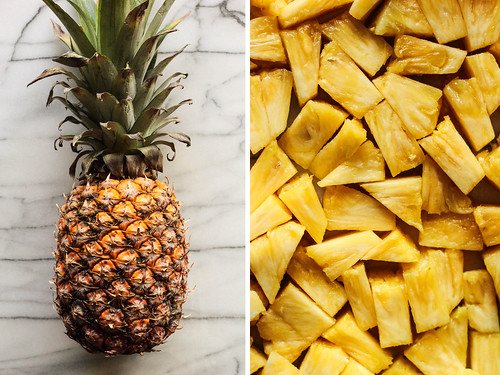
When you should not eat canned pineapples during lactation
Fruits, even canned ones, are an excellent source of vitamins and nutrients necessary for a nursing mother’s body.
It is not at all necessary for a young mother to give up her favorite foods during breastfeeding if her baby is already several months old and if he is not allergic.
However, there are a number of typical situations when it is still better to refuse canned pineapple for some time and postpone the tasting to a later date. And most often this is due to the well-being of the infant itself.
- If your baby suffers from allergies very often and you have to adhere to a strict diet during lactation, then it is best not to eat pineapples at all until you stop breastfeeding. Canned pineapple is not a very common product on our table, and therefore for the sensitive body of an allergic child it can even cause diathesis or intestinal disorders.
- Avoid pineapples from a jar even when the baby is still too small.
Such treats are permissible on the menu of a mother of a three-month newborn baby, but certainly not for a woman whose baby has just been born.
- If the baby often suffers from tummy pain and reacts sharply to any new product eaten by a nursing mother, you should not eat canned pineapple either. In addition, such an exotic plant has one pronounced property - it weakens the intestines, which can lead to the formation of gas in the abdomen and diarrhea.
- Pineapple from a can is not very good for those nursing mothers who often experience bloating. In this case, it is better to follow a diet that will help control the proliferation of bacteria in the intestines, thereby preventing painful cramps in the stomach.
- When choosing a product from the supermarket shelves, make sure that canned pineapples do not contain any potentially hazardous substances. Ideally, the packaging should not indicate any unnecessary ingredients, only water, sugar syrup and the fruit itself. Refuse to purchase if you find too many additional substances in the composition.
How to select and store
When purchasing a fetus, pay attention to the following points:
- there should be no rot, mold, or damage;
- A quality pineapple has a pleasant aroma, but not too strong. The latter indicates overripeness;
- when pressed, the skin is slightly dented, but is restored again;
- For long-term storage, choose unripe fruit - it will ripen at home;
- the color of the peel is yellow-green, the scales have the same shape, their size increases towards the center;
- leaves are fresh, deep green;
- When you hit a ripe fruit, a dull sound is heard.
Unripe pineapple has a powerful laxative effect on the body. It is important to purchase ripe fruit.
A high-quality ripe fruit has several characteristics:
- pay attention to the place where the pineapple attaches to the mother plant; it is opposite to the green tail. If the fruit is ripe on the tree, this part will be small and wrinkled. Fruit picked before ripeness is wide at the base;
- If you pull a green leaf, it will easily come off on a ripe fruit. The entire tuft can be unscrewed by turning;
- When cut, the ripe fruit is deep yellow. A pale shade indicates immaturity;
- A ripe pineapple has an attractive, appetizing appearance, golden skin, and a bright bunch of leaves. The scales are dark at the tips.
Store the fruit in the refrigerator on a vegetable shelf at a temperature of 7 to 10 C and a humidity of 90% for two weeks, inspecting it periodically. If dark spots appear on it, all damaged areas are removed before use.
To extend shelf life, pineapple is cut into pieces and dried. The resulting candied fruits last up to 10 months. You are allowed to consume canned fruits throughout the year. And frozen pieces are used for food for 4 months.
In room conditions, the fruit remains for up to 3 days. The air temperature should not be higher than 20 C. Choose a dry, ventilated place. If several fruits are stored, the distance between them should be 10 cm.
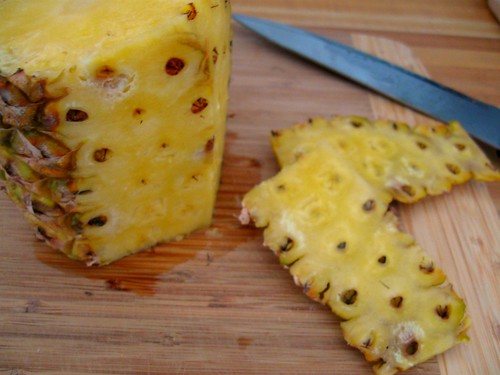
How the composition “works”
A tropical fruit, we will call it that according to generally accepted standards, is a fruit with vitamins A, B, C, PP and microelements: zinc, potassium, manganese, phosphorus, iron, selenium, acids that “burn” fats and help activate metabolism in body. The product surpasses even citrus fruits in terms of vitamin C content.

The beneficial properties of the fruit are quite varied:
- Increases tone, performance, promotes activity and energy.
- During breastfeeding, it strengthens the immune system and protects the mother’s body from the negative effects of the environment.
- Pineapple during breastfeeding helps improve digestion, normalizes metabolic processes and “triggers” the breakdown of fat cells in the body.
- Normalizes blood pressure, eliminates headaches and sleep disorders.
- Regular consumption of the fruit helps strengthen the heart muscle and prevents heart attacks and strokes.
In addition, the fruit is an excellent diuretic, removing excess fluid from the body, which is an excellent prevention of edema.
Rules for use during lactation
When introducing fruit into your diet, follow the recommendations:
- You can try pineapple after 3 months. Eat a piece weighing 30 g;
- then observe the baby’s reaction throughout the day;
- if there are no problems with digestion, no skin rash, crying, anxiety, pineapple during lactation is included in the menu without fear.
The maximum daily intake is 200 g of fruit pulp. Pineapple is eaten no more than 2 times a week. You can replace the fruit with kiwi, apple, tangerine - if you are not allergic to them.
Rules of use
- It is recommended to introduce pineapple into the diet of a nursing woman from 6 months, but it is also allowed from the age of four months.
- You should not rely on pineapples if this fruit did not arouse your particular interest even before pregnancy. Now is not the time to experiment.
- You prefer only quality products.
- Start introducing this fruit with small portions. Take half a teaspoon of pulp and eat it in the morning. Monitor your baby's health. If something happens that differs from the usual norms, then you should exclude pineapples from your diet. If nothing was found within two days, the child behaves as before - the mother can gradually increase her portion, the maximum daily norm is 200 grams of the pulp of this fruit.
- You should not eat pineapple more than 2 times a week.
- Mommy should understand what risks exist when consuming this fruit and exclude it from her diet if she is diagnosed with any contraindications.
Pineapple diet
The weight loss system involves eating fresh fruits. This technique is suitable for nursing mothers due to the rich composition of the fruit, thanks to which the body will receive all the vital components. Bromelain in fruits breaks down protein, it is better absorbed, and as a result, extra pounds are lost.
There are many menu options. These are two-day mono-diets, weekly diets and even drinking pineapple for a month with vodka.
The strictest are fasting days with eating only one fruit. This diet is allowed to be practiced no more than twice every week. One kilogram of weight is lost per day.
The fasting day is carried out like this:
- arrange 4 meals - two breakfasts, lunch, dinner;
- They eat half a kilo of pineapple pulp at a time;
- Throughout the day, drink a liter of tropical fruit juice without sugar.
The 5-day diet allows you to lose 5 kg. The first two meals and the amount of liquid drunk per day are the same. Breakfast consists of 100 g of pineapple pulp, 100 g of low-fat yogurt, 2 tbsp. spoons of oatmeal. For the second meal, eat a boiled egg, a sandwich with cow's butter and lightly salted salmon on rye bread. The third and fourth meals are different. During each of them, 100 g of pineapple pulp is consumed in its pure form or added to dishes.
The rest of the product set looks like this:
| Day | Dinner | Dinner |
| First | Boiled brown rice with curry | Two jacket potatoes, 50 g of cottage cheese with sour cream, horseradish |
| Second | 100 g boiled chicken | Shrimp, celery, cucumber salad |
| Third | Salad of half a bell pepper, 2 tomatoes | Turkey fillet 100 g, rye croutons |
| Fourth | Salad of 1/4 orange, two spoons of green peas, 100 g chicken | Celery soup |
| Fifth | Two sugar-free puff pastries with pineapple | Brown rice 100 g |
The diet is prohibited for diseases of the gastrointestinal tract and diabetes.
Beneficial features
Pineapple is a perennial herbaceous plant, that is, grass... It comes from South America. Few people know this and prefer to call it a tropical fruit, recognized as a real exotic delicacy.
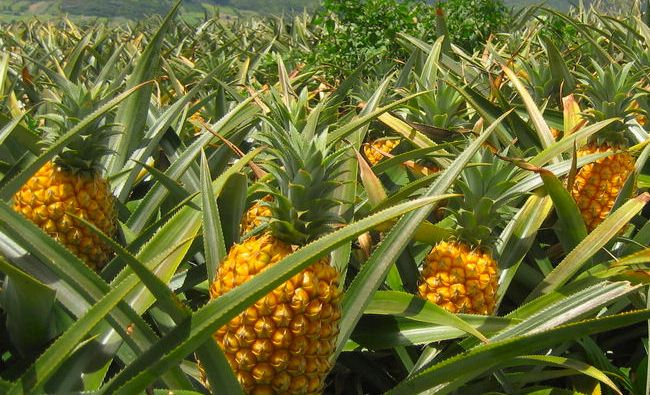
It has gained immense popularity due to its unique aroma and sweet taste. The fruit is rich in a variety of vitamins, microelements and acids, due to which it has the most beneficial effect on the female body. It activates metabolism, which allows a woman after childbirth to quickly return to her usual shape.
Knowing the numerous beneficial properties, and appreciating the amazing taste of the overseas herb, it is clear why many nursing mothers strive to include this fresh or canned exotic fruit in their diet. Let's consider whether it is still possible for a nursing mother to consume pineapple.
Canned pineapple for breastfeeding
The calorie content of the product is 57 kcal per 100 g. It contains exotic fruit, water, sugar. Unfortunately, the bromelain enzyme is not preserved during canning, and therefore canned pineapples will not help you lose weight while breastfeeding.
There is no harm from fruit prepared in this way, but allergy sufferers should eat it in moderation. Canned pineapple in sugar is dangerous for obese people. If the fruit was prepared in its own juice, it contains all the beneficial elements as in fresh fruit.
Can a nursing mother eat canned pineapple? The product is allowed for consumption, but you should not abuse it. It is included in the menu in the same way as fresh fruit, starting with a small portion weighing no more than 30 g. If the baby is not allergic, canned pineapples are allowed to a nursing mother no more than twice a week, in a volume not exceeding 200 g per day.
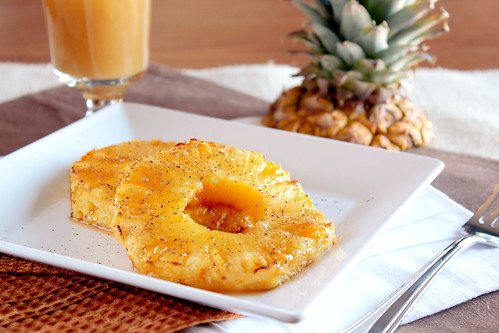
Benefits of pineapple during breastfeeding

Pineapple is valued for its juiciness, original sweet and sour taste, bright aroma and abundance of nutrients contained in the light yellow pulp.
According to biochemical studies, per 100 grams of peeled fresh fruit pulp there is:
- 0.4 grams of protein;
- 86 grams of water;
- 11.5 grams of carbohydrates;
- 0.4 grams of fiber.
Pineapples are extremely rich in ascorbic acid, they contain beta-carotene, vitamins B1, B2, B12 and PP, valuable macro- and microelements, as well as many acids, aromatic and essential oils.
It would seem that such a product should certainly be included in the menu of nursing mothers, but pediatricians and nutritionists are not so optimistic. So what are the benefits of pineapple during breastfeeding? And how can this exotic fruit harm the health of mother and baby?

In addition to the fact that fresh pineapple is an excellent source of vitamin C, which helps maintain tone, performance and protect the body from external factors, consuming the pulp allows you to:
- reduce blood viscosity, thereby reducing the risk of developing thrombosis and varicose veins;
- improve the quality of blood vessels and the functioning of the entire cardiovascular system;
- prevent or significantly reduce the accumulation of cholesterol;
- effectively relieve swelling and prevent their occurrence in the future;
- reduce joint and muscle pain.
At the same time, a woman who consumes pineapple while breastfeeding does not have to worry about her own weight, because the pulp of a ripe pineapple contains only 48 kcal per 100 grams.
As a source of essential acids and vitamins, pineapple has a beneficial effect on the body's protective functions, gently boosting the immune system. Therefore, eating the fruit is especially useful during the cold season and off-season.
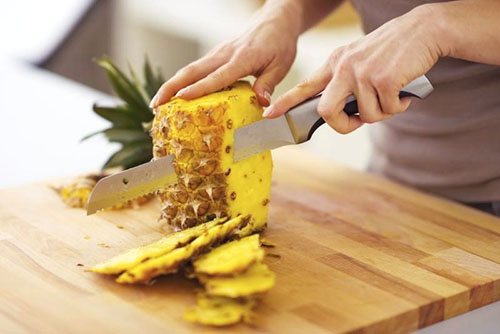
After childbirth, many mothers experience nervous tension, frequent mood swings and signs of approaching depression. Pineapple, which contains potassium that improves the supply of oxygen to the brain, can help get rid of such unpleasant symptoms in a nursing mother. In addition, the pulp of the exotic fruit strengthens the heart, relieves chronic fatigue and stimulates the production of serotonin.
Thanks to a small amount of pineapple in the menu, you can improve your digestion and quickly get rid of toxins and excess moisture.
Juice
The calorie content of the product is 52 kcal per 100 g. Unlike whole fruit, the juice does not contain dietary fiber. All nutrients are retained in it. But packaged store-bought products contain preservatives and sugar syrup, which are undesirable during lactation.
Can a nursing mother drink pineapple juice? The drink is allowed for consumption. It is added to the menu 4-5 months after birth. To prepare, the fruit is peeled, cut into pieces, and placed in a juicer. Drink the drink immediately before the beneficial substances are destroyed.
How to determine a pineapple allergy?
You can understand that you are allergic to pineapple using the following symptoms:
- The appearance of hives, noticeable redness, itching and a localized small rash.
- From time to time, you may experience a cough, watery eyes, and even a runny nose.
- Problems with the gastrointestinal tract and constipation may appear.
- Lips may become red.
- There will be a slight swelling of the face or it will become noticeably red.
- In some cases, a symptom of difficulty breathing is observed.
- The appearance of shortness of breath.
- Constant sneezing.
- Nausea and vomiting.
- Tumor of the larynx.
- Cough.
- Hoarseness.
- Feeling of discomfort in the stomach area.
- Dizziness.
If at least one of the symptoms appears, we recommend that you go to a doctor and stop eating this fruit.
In conclusion, we note that when consuming good pineapples, there will be no harm to the expectant mother. They will do much more good than harm. If there are no compelling reasons, then there is no need to refuse their consumption. Of course, it is not recommended to get carried away with eating pineapples, because everything should be in moderation. If a nursing mother consumes them in large quantities, the baby may develop a rash. But you can diversify your diet with a few juicy slices. This will help replenish a number of useful substances.
Recommended video:
Read along with this article:
- Can a nursing mother have pine nuts and how much?
- Can a nursing mother eat cabbage? Will the vegetable harm the baby’s health?
- How to eat muesli correctly, recommendations for consumption
- Is it true or false that milk helps with heartburn?
- Is it possible for a nursing mother to boil a boiled egg - the benefits of the product and possible harm
- Diarrhea in a mother while breastfeeding: the danger of diarrhea during...
- What are the benefits of bananas for the health, youth and beauty of women?
- What to do if your one-month-old baby has diarrhea? In what cases does not...
- Pomegranate is eaten with or without seeds, we tell you how to do it correctly
Candied fruit
The product is pieces of fruit boiled in sugar syrup and dried. They can easily replace candy. Calorie content is 98 kcal per 100 g. During product production, the amount of moisture is reduced, preservatives E220 and sulfur dioxide are added. This sweet composition can cause heartburn, skin rashes, and coughing attacks.
Is it possible for a nursing mother to have candied pineapple? Yes, the treat is consumed during lactation, but in moderation due to the risk of allergies in the baby. You can add 5 small pieces to porridge or cottage cheese. It is better to prepare candied fruits for a nursing woman at home. This product is free of harmful additives.
To prepare, take one ripe fruit, 800 g of sugar, 500 ml of water, 1 tbsp. l. powdered sugar. The pineapple is peeled, cored, and cut into small pieces. Syrup is prepared from water and sugar by bringing the liquid to a boil. Place the pineapple there and wait 10 minutes. The mass is cooled for 3 hours. Boil another 4-5 times. Pieces of fruit are placed in a colander and allowed to drain. Then place in the oven and dry for 5-6 hours over low heat with the door open.
Possible pineapple allergy
Fresh fruit contains much more useful elements that a woman’s body, weakened by childbirth, needs. Fresh products are much less likely to provoke an allergic reaction than canned products. For this reason, a nursing mother should not consume canned food.
If a woman did not eat exotic fruits during pregnancy, this will be the first time for the child. Everything that the mother eats during the period of gestation is, to some extent, transmitted to it through the umbilical cord.
During lactation, it is better not to experiment with various allergens, because... can harm the child. And often it is impossible to predict how the baby’s body will respond. Experts advise nursing mothers not to include pineapple in their diet.
But if the fruit has already been eaten, then the presence of an allergic reaction in a child can be determined by eye. It manifests itself as follows: a rash with redness appears. An allergy can occur within 48 hours after introducing a new product into a mother’s diet.
We recommend that you read the Calorie content of beans
When the allergen is excluded from the diet, the reaction goes away on its own after 2 days. If an allergy occurs in a baby, you should immediately contact your pediatrician, and the mother should completely avoid this product until breastfeeding stops.
It is best to introduce a new product into your diet after your baby is 3 months old. It is not recommended to include several fruits in your diet at the same time.
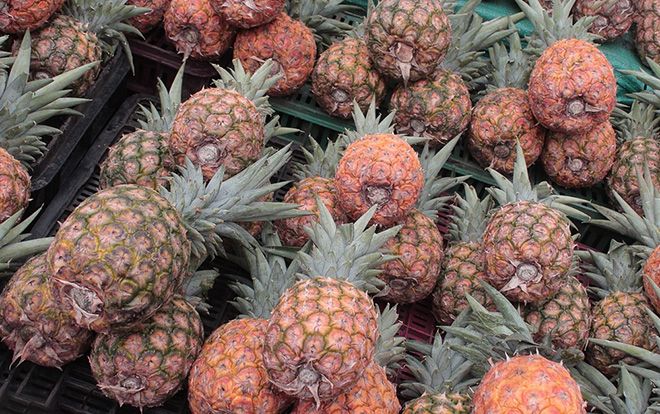
Dried pineapples
The product is high in calories - 347 kcal per 100 g. Coarse fiber has a positive effect on the condition of the intestines, mineral components - magnesium, zinc, phosphorus - normalize the activity of the nervous system. Dried pineapple during breastfeeding helps to avoid cardiovascular disorders, thrombophlebitis, and atherosclerosis. Dessert is not useful for those suffering from ulcers, pathologies of the gallbladder, kidneys, urolithiasis, or with a tendency to allergies.
To make pineapple chips at home, peel the fruit and cut into thin slices. Place the pieces on parchment paper and place in the oven for about an hour. As soon as the slices have darkened and hardened, the delicacy is ready.
Fresh fruits for breastfeeding
Many people are interested in whether it is possible for a woman to eat fresh pineapple fruits while breastfeeding. Doctors believe that this is not worth doing. If during pregnancy a woman wanted to eat pineapple and she ate it, then a breastfed baby will most likely respond well to this product.
The introduction of a new product should be carried out gradually and better when the child reaches 6 months of age. Doctors strongly recommend consuming only fresh fruit.
Benefits for nursing mothers
When answering the question of whether women can eat pineapple during breastfeeding, it is necessary to consider in more detail all the beneficial properties of the fruit. It contains many vitamins and minerals:
- One of the most useful is vitamin B1, or thiamine. It helps produce acetylcholine, which is useful for maintaining heart function.
- Vitamin B2 is involved in the production of hemoglobin, which is important not only during pregnancy, but also during lactation.
- Vitamin B6 helps in strengthening human immunity.
- Vitamin B3 provokes gastric secretion. The presence of vitamin A and C in pineapple improves vision.
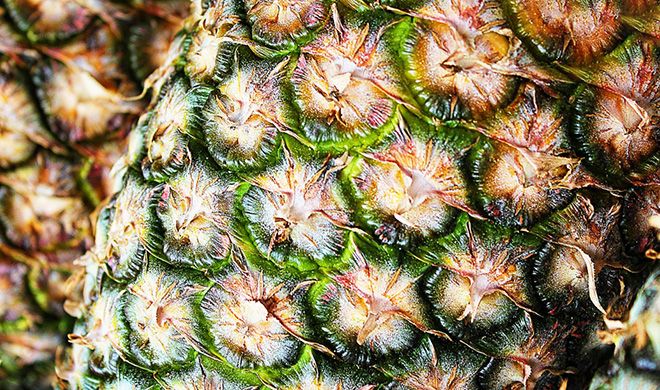
Due to the presence of a large amount of fiber, quick saturation occurs. The presence of potassium and magnesium helps normalize a woman’s blood pressure levels. Also, eating fruit allows you to remove excess water from the body, reduces the likelihood of headaches and sleep problems. Pineapple is a good antidepressant.
Benefits of an infant
In the absence of an allergic reaction, the child, like the mother, will receive a large number of useful elements. For example, vitamin C, when ingested by a nursing woman, promotes the production of such a useful element as collagen, which is passed on to the baby through milk. This substance promotes the normal development of bone tissue, healthy skin and cartilage joints.
Vitamin C strengthens the child's immunity. Since pineapple contains manganese, eating the fruit has a positive effect on the growth of bone tissue.
The content of various B vitamins activates the production of red blood cells and fights anemia. Copper, which is contained in the pulp of the fruit, improves the functioning of the heart muscle. Folic acid and iron reduce the likelihood of bleeding.
We recommend that you check out Catnip for cats
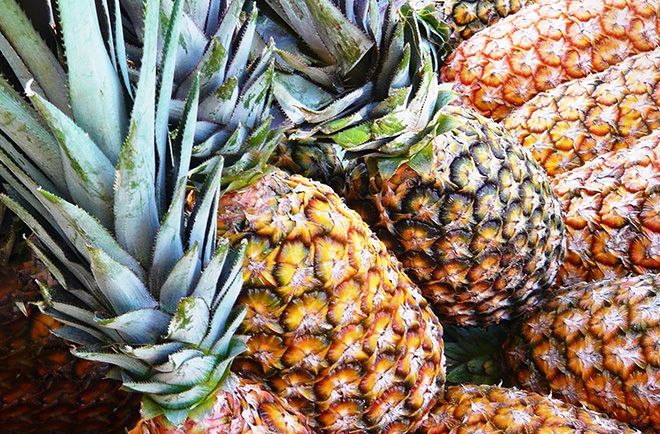
Recipes for food and drinks for nursing mothers
The exotic fruit is used to make tea, smoothies, salads, and main courses.
Tea with pineapple
To prepare the drink, use black or green tea. In the second case, the taste will be softer. Take a piece of pineapple weighing 100 g and cut it into slices. Place in a teapot, add a pinch of cinnamon and orange zest. Add two small spoons of tea leaves. Pour boiling water over and leave for a few minutes. Drink hot or with ice.
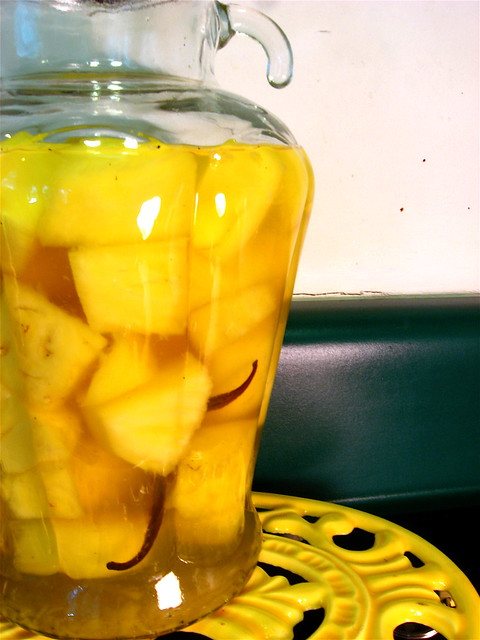
Smoothie
Ingredients:
- pineapple - 400 g;
- natural yogurt - 2 cups;
- two bananas;
- a pinch of vanillin.
Peel the pineapple and cut it into slices, bananas into slices. Mix with yogurt using a blender. The drink is poured into glasses, sprinkled with vanilla, and served.
Salad
Ingredients:
- chicken - 400 g;
- eggs - 4 pcs.;
- onion - 1 pc.;
- pineapple - 300 g;
- cheese - 200 g;
- mayonnaise - 200 g;
- salt pepper.
The chicken is boiled, chopped, laid out in a layer on a plate, and coated with mayonnaise. Boiled eggs are cut coarsely. Place on top of the chicken. Season with pepper. Then - layers of onions, fruit, grated cheese.
Meat with pineapple
Ingredients:
- pork carcass pulp - 600 g;
- canned pineapple in rings - jar;
- soy sauce - 50 ml;
- pineapple syrup - 50 ml;
- cheese - 150 g;
- rast. oil.
The meat is cut into steaks and lightly beaten. Soy sauce is combined with syrup. Soak the pieces of meat and put them in the cold for an hour. Then place on a greased baking sheet. Place a pineapple ring on each piece and pour sauce over it. Place on the oven shelf for 30 minutes. Cover with grated cheese and cook for another 5 minutes.
Eating pineapple during lactation
So, can a nursing mother eat pineapples? Doctors answer this question ambiguously: this tropical fruit is both extremely beneficial and quite harmful to the body of a nursing mother. The baby also feels harm from exotic foods, manifested in the form of an allergic reaction, pain and colic in the abdomen.
When feeding a newborn, a mother is allowed to include fresh or canned pineapples in her menu, but this must be done with extreme caution and slowly. Mothers ask how long after giving birth they can introduce such an exotic product into the diet. This is best done 4-6 months after the baby is born.
This wish of pediatricians is justified by the fact that a baby at this age already has a strong, formed immune system, and the baby’s digestive system already independently digests such exotic foods.
Let's look at how to properly eat pineapple while breastfeeding:
- It is best to start eating tropical fruit with minimal portions. To get to know it, a small, thin piece is enough.
- After eating pineapple, you must carefully monitor the condition and behavior of the baby. Any rashes, redness on the skin or colic in the tummy may indicate that it is better for the mother to stop eating the fruit.
- If no negative reactions are observed on the part of the child, the amount of pineapple consumed can be gradually increased.
It is important for a nursing mother to remember that under no circumstances should she eat too much pineapple, either fresh or canned, or introduce several new foods into her diet at the same time. This can place increased stress on the child's body.

What's the best way to eat the fruit?
The fresh product is considered the most useful and nutritious, since its pulp contains all the necessary vitamins and microelements. The fruit must be peeled, cut off the hard middle and cut into rings. It is enough to eat one such ring per day.
The fruit can be baked or included in a variety of fruit salads or light desserts. Healthy candied fruits are made from this exotic fruit, where all vital vitamins, microelements and nutrients are preserved.
If we talk about canned pineapples, doctors believe that it is best for nursing mothers to avoid eating such a product. During heat treatment, tropical fruit loses almost all its beneficial substances, and therefore such a dish will not bring any benefit to a nursing mother and her baby.
Folk recipes
A healing extract is obtained from pineapple, which helps burn fat deposits and has enzymatic activity. The product contains more nutrients than fresh pineapple. Pharmaceutical companies produce drugs for oral administration. Traditional medicine offers recipes based on the fruit.
From blockage of blood vessels
The pineapple fruit is ground. The gruel is poured with a liter of vodka, closed, and placed in a dark place for a couple of weeks. Take the finished tincture one tablespoon 15 minutes before meals.
To boost immunity
Drink one or two glasses of freshly squeezed pineapple juice daily. The remedy will help not to get sick during an exacerbation of ARVI.
For dry skin
A piece of the fruit is wiped on the face in the morning and evening. After a week, the skin will become soft and elastic.
Fighting excess weight
The tops and peel of one fruit are passed through a meat grinder. Pour 3 liters of water, boil for 10 minutes along with 30 ml of vodka or alcohol. The mixture is filtered, the pulp of one pineapple is added. Drink a quarter glass half an hour before each meal.
During breastfeeding, pineapple heals the body due to the nutrients it contains. The fruit has an anti-inflammatory effect, protects against viruses, stimulates digestion, and gets rid of extra pounds. Healthy drinks are prepared from the fruits, containing vitamins A, E, C, PP, K, group B, restoring maternal health and promoting the harmonious development of the baby.
If you find an error, please select a piece of text and press Ctrl+Enter.
Useful properties, chemical composition
The exotic fruit is an irreplaceable source of macro- and microelements, various groups of vitamins required for the proper functioning of the body. The nutritional value of pineapple is 48 kcal per 100 grams of product.
It contains:
- proteins - about 0.3 g;
- carbohydrates - approximately 11.8 g;
- fat - 0.1 g.
The fruit contains vitamin C, the role of which is its antioxidant properties. The substance increases the body's defenses, strengthens connective tissue fibers, and ensures elasticity and smoothness of large vessels and capillaries.
Pineapple also contains:
- vitamin PP - necessary for lowering cholesterol levels, also normalizes blood pressure and the process of fat metabolism;
- vitamins B1, B2, B5, B6 - are responsible for metabolic processes;
- provitamin A - prolongs youth, prevents the development of heart diseases.
Of the micro- and macroelements, potassium, calcium, magnesium, and iron are contained in significant quantities. In addition, the fruit contains bromelain. The substance promotes wound healing, anti-inflammatory processes, strengthens the immune system, and prevents the occurrence of blood clots.
Menu Introduction
Is it possible to eat pineapple while breastfeeding and when is it introduced into the mother’s diet? It is better to start introducing pineapple into the menu when the baby is about six months old. At this point, the child’s immunity will be stronger, the intestines will be filled with beneficial microflora, and the reaction to new food will not be so violent. But first, of course, it’s worth coordinating the start of your appointment with your family doctor.
Canned pineapples do not contain any nutrients. The fruit is in syrup with synthetic preservatives, flavor enhancers and citric acid, which can provoke the development of allergies and stomach diseases.
According to doctors' advice, you should start with a small slice of fresh fruit. Then you should observe the child’s reaction after eating a piece. If the baby does not experience digestive disorders or rashes in the form of diathesis within two days after feeding, then the nursing mother can continue to eat the fruit in small portions, constantly monitoring the baby’s condition. Since this is an acidic fruit, it is better to eat it not on an empty stomach, but some time after breakfast.
Delicious candied fruits
Candied pineapple peels look very attractive, but they are less healthy than freshly cut fruits. 100 grams of multi-colored candied fruits contain about 92 kcal, 18% carbohydrates, 37 g protein, 2.2 g fat. During their production, the amount of moisture is reduced, the preservative E220 and sulfur dioxide are used, which destroys vitamin B1.
Because of this composition, tasty colored pineapple sticks can cause heartburn, allergies, and asthma attacks (if the young mother has a predisposition). Allergens pass into breast milk and cause reactions in babies. Snacking on candied fruits during breastfeeding is not recommended. The maximum you can afford is up to 5 cubes per day, added to porridge or cottage cheese.
READ ALSO: Can I eat bananas while breastfeeding?
Is it possible to eat pineapple while breastfeeding if the baby is feeling well?
Can a mother eat fresh pineapple during breastfeeding if the child does not show signs of allergies or anxiety? Give it in small amounts and watch the child very carefully. You may not notice the first signs of an allergy, so you should not make hasty conclusions. Allergies can be “cumulative”, that is, the allergen can appear suddenly when the small body is unable to resist it.
If canned pineapples are in a salad, can a pregnant mother eat salad? It is preferable to refuse such a food, because the salad contains several components, and it will be impossible to determine what exactly the baby is reacting to.
On a note! You should absolutely not eat pineapple in the first month if your baby is breastfed!

Mom can introduce pineapple into her diet only if the baby feels well and does not have allergy symptoms
Is it possible to have pineapple juice for breastfeeding?
Store-bought juice is a preservative, with dyes, flavors, diluted pineapple juice, which does more harm than good for the baby. But even fresh pineapple juice is not recommended to be drunk in its pure form, undiluted. Firstly, it leads to thinning of tooth enamel. Secondly, the acid in the juice is even more concentrated than in a fresh piece of pineapple. And the slice you could afford contains significantly less natural juice than the volume in the glass. Taking into account all these factors, you can consume no more than half a glass, always diluting it with water in a ratio of 1:3 or even 1:4. Then a breastfed baby will not receive a shock dose of substances that can harm him.
Pineapple juice
Unlike the pineapple itself, its juice does not contain coarse fibers that are beneficial for digestion. It preserves beneficial vitamins, bromelain, and microelements. Store-bought reconstituted juice does little good. It contains fewer vitamins, and bromelain is completely absent after heat treatment. In addition, sugar syrup and preservatives are added to packaged juice, the use of which is undesirable.
Like the fruit itself, the mother is allowed to try its juice only 4-5 months after birth. To prepare, the ripe fruit is peeled, cut into pieces, and sent to a juicer (it is almost impossible to squeeze fresh juice out of it without the help of household appliances). You need to drink the juice on an empty stomach within 10 minutes after preparation (vitamins are destroyed over time). If it seems too sour, it should be diluted with water.
READ ALSO: What juice can a mother drink while breastfeeding?
Canned pineapple
If the cooking technology is followed, the fruit retains all its beneficial qualities. But that rarely happens. During heat treatment, the fruit loses its properties. Citric acid is usually added to it as a preservative. The cost of canned pineapple is lower than fresh. And this does not surprise anyone. Canned pineapple is not suitable for a nursing mother, because in this case the harm from eating it will be more than good.
Don’t buy pineapples for future use - they lose nutrients.
After eating this exotic fruit, rinse your mouth with water to prevent harmful effects on tooth enamel.
During breastfeeding, pineapple can be introduced into the mother’s diet when the child reaches the age of 4 months, or better yet, 6 months. But this must be done with caution. Beneficial bacteria do not appear in the baby’s intestines from the first days, but gradually, just like immunity.
If you really want to try the fruit, then a nursing mother can start eating pineapple with one small piece and no more than once a day. In this case, it is necessary to monitor the reaction on the child’s skin. If redness or rash appears, stop eating the fruit! If everything went well, then you can include pineapple in the menu. It is recommended to dilute the juice of this product with fresh carrot juice.


